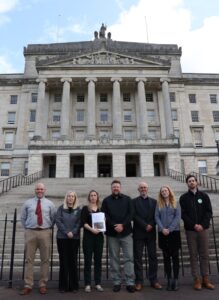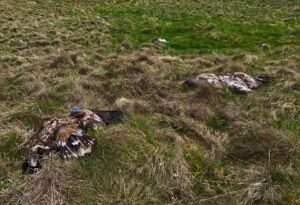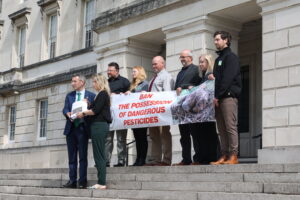50,000-signature petition, calling for a ban on poison possession, handed into Stormont.
 Today (17th June), a petition begun by the Northern Ireland Raptor Study Group (NIRSG), calling for the possession of various toxic pesticides to be made illegal, was handed in to officials at Stormont by representatives of the Group, alongside staff from RSPB NI and Ulster Wildlife.
Today (17th June), a petition begun by the Northern Ireland Raptor Study Group (NIRSG), calling for the possession of various toxic pesticides to be made illegal, was handed in to officials at Stormont by representatives of the Group, alongside staff from RSPB NI and Ulster Wildlife.
The petition, which was instigated in response to the widely condemned poisoning of two young White-tailed Eagles in Glenwherry, Co Antrim, in May 2023, has garnered over 50,000 signatories from Northern Ireland and beyond.
The eagles died after consuming a bait laced with Bendiocarb, a chemical prohibited from outdoor use in Northern Ireland, and were the latest victims in a series of poisoning incidents here that has claimed the lives of over 60 protected birds of prey in recent years.
NIRSG’s raptor officer, Dr. Eimear Rooney said: “The day we recovered the bodies of those two eagles from the hillside at Glenwherry was one of the most upsetting of my career working with Northern Ireland’s raptors. White-tailed Eagles are only just making a return to our skies after being made extinct on the island of Ireland by past human actions over 100 years ago. But it’s not just eagles that fall victim to the criminals illegally using these poisons – it’s Red Kites, Buzzards and Peregrine Falcons as well as people’s pet cats and dogs.”
Dawn Miskelly, Ulster Wildlife CEO, said “Poisons have devastating impacts on raptor populations. Protecting these birds from poisoning is not just about conserving individual species – it’s about safeguarding and preserving biodiversity for future generations. We urgently call on the Assembly to recognise the significant public concern around this issue and act by resolving to create legislation to make the possession of these toxic pesticides illegal.”
Ian Thomson, RSPB’s Investigations Manager added “Similar legislation in Scotland has led to the successful prosecution of a sizeable number of individuals linked to the illegal poisoning of wildlife. There is no legal reason to hold onto these chemicals, long banned from use, but we repeatedly see Northern Ireland’s birds of prey fall victim to these same substances. Making their possession illegal here will make identifying the perpetrators of these crimes more straightforward, will hopefully create a significant deterrent to the illegal use of poison, and most importantly, will help protect wildlife, domestic pets and people from harm.”
Dr Marc Ruddock, also from NIRSG, continued: “The Wildlife Order already includes legislation banning the possession of pesticides containing a proscribed ingredient, but, in the 14 years since that legislation was passed, lawmakers have never produced the required list of proscribed ingredients. This means that highly toxic poisons such as carbofuran and aldicarb, banned from legal use, are being stored and utilised by those wishing to do harm to our wildlife. It is clear that the intention of the legislature, in passing these laws back in 2011, was for the possession of these awful chemicals to be a crime, but the final step to do so was never completed. It needs to be done, now, with no further delays and recognise the public’s considerable concerns and acts quickly to create a pathway to finally resolve this issue.”
The organisations that attended today at Stormont are all members of the Partnership for Action Against Wildlife Crime and previously met with DAERA officials. They were also able to discuss their concerns with Minister of Agriculture, Environment and Rural Affairs, Andrew Muir MLA, yesterday.
Dr. Rooney added “Our meeting with the Minster was welcome and constructive, and he acknowledged that the poisoning of our birds of prey is deeply concerning. We are grateful to Minister Muir for meeting us today at Stormont and receiving the petition.”
